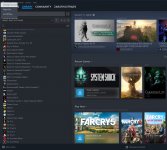Linux is getting better for gaming all the time. I'd agree that it is not 100% there yet (despite its evangelists) but its much better than you probably think it is.
DXVK and Proton are built right into the Linux version of the Steam client these days, so all you need to do is install and launch the game as you normally would and chances are it will work, even if there isn't a native Linux port. It's not 100% though, sometimes you'll have to hit the forums or use trial and error and try a different version of proton for the best experience (but this is easy, and is done in the GUI of Steam)
It is rare to find a title that doesn't work. Only downside is that there is usually a performance hit compared to running under Windows, but that is getting better all the time.
I'd familiarize myself with it. Linux has been improving so fast for gaming that if it continues, there will be a point in time when it really is an equivalent experience. If you have tested it out and know it well, you can assess when it is good enough for you (or when Microsoft pisses you off enough) and be ready for the switch.
I test it every couple of years, and every time I do I'm surprised by how much better it has become. In ~2015 it was **** near unusually bad even for native Linux ports, insisiting on running games on my side monitors with no way to switch it, etc. Now even most Windows games with no Linux port run well, albeit with some performance hits, but the performance bit keeps getting better.
Of course, it figures, as I am talking about how much better it has become, there seems to have been a regression on Linux since the new Steam, user interface was introduced. They screwed up the client, and the fonts are all too big for the layout which is making it difficult to navigate.
View attachment 2557
In general it works really well though, and I could still sign in with and use this version of the client (with a little bit of navigation difficulty). This is the first time I've seen something like this in several years of testing the Linux Steam client, so it is atypical.

